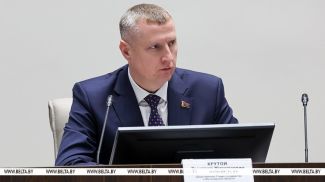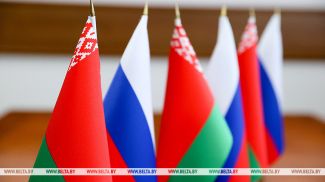
An archive photo
MINSK, 21 August (BelTA) – Belarusian companies will gain access to new investors in the EAEU through the issuance of securities, Tatiana Grib, Deputy Head of the Securities Department - Head of the Securities Market Performance Analysis Division of the Securities Department at the Finance Ministry, said during a webinar held by the National Center of Legislation and Legal Information, BelTA has learned.
Belarus and Russia have ratified an agreement granting cross-border access for the issuance and trading of securities on regulated exchanges within the EAEU. The agreement will enter into force after the other EAEU member states complete the ratification process.
It will allow companies from one EAEU country to more easily and quickly list their securities on the regulated exchanges in the other member states of the union. This agreement has two core requirements: securities must be both domestically registered and listed on the premier tier of their national stock exchange.
“At present, the procedure for getting cross-border access is as follows: securities are registered in their home country, the issuance documents undergo re-registration with the regulator in the host country, followed by the admission of these securities to the host exchange. In other words, it was previously necessary to register the securities issue twice. Now, if shares or bonds of a Belarusian issuer are in the premier listing tier of the Belarusian Currency and Stock Exchange, the issuer has the right to apply to any other exchange within the EAEU and gain access to new investors,” explained Tatiana Grib.
The highest listing tier essentially signifies a quality mark for the securities of any issuer. This means the exchange has recognized them as reliable and the issuer’s operations as efficient and sufficiently transparent.
For example, in Belarus, the premier-tier listing is held by securities of the Finance Ministry, the National Bank, and shares of Belarusbank and Belagroprombank. In other EAEU countries, securities of nearly 200 issuers, primarily from Kazakhstan and Russia, are recognized as premier-tier securities. These also include government securities, as well as shares and bonds of enterprises in the oil and gas sector, the IT sector, and companies from some other sectors.
Currently, there are six stock exchanges operating within the framework of the EAEU, including the c and the Kazakhstan Stock Exchange. The Moscow Exchange alone has over 35,000 retail investors registered.
“The countries of the Eurasian Economic Union confirm their readiness to admit securities from the most reliable and well-established issuers to each other’s stock exchanges. The initiator of the admission must always be the issuer itself. A specific package of documents is prepared in accordance with the requirements of the host exchange. The exchange reviews the papers and makes a decision, which it then communicates to the applicant. The advantage of this mechanism is that it is always more convenient for issuers to register their securities under long-familiar and well-understood legislation,” noted the representative of the Finance Ministry.
An agreement to grant EAEU brokers and dealers cross-border access to regulated trading is final and nearing signing.
“This document will allow exchanges to mutually recognize national licenses issued by other regulators and grant professional participants direct access to each other’s regulated trading. For example, if a Belarusian investor wishes to purchase securities on the Moscow Exchange, professional participants from Belarus will be able and willing to facilitate this for them. It bears underscoring that professional participants (intermediaries) will enter the market exclusively with clients from their country or will be able to provide services to clients from third countries (non-EAEU member states),” the Finance Ministry representative said.
“To date, Belarusian legislation already allows foreign investment companies to directly take part in trading on the Belarusian Currency and Stock Exchange. However, unfortunately, professional participants from Belarus cannot do that in some EAEU countries. This agreement will address this problem, and the Belarusian professional community will be granted significantly more opportunities,” the specialist pointed out.
“The agreements will help Belarusian issuers to access foreign stock markets. However, we should not limit ourselves to this single channel for attracting investment. It is necessary to attract capital from various sources. We should also keep in mind the possibility of attracting an anchor investor, who would serve as a guarantor of the company’s reliability. Emphasis should be placed on ESG investments, as global interest in them is growing. Belarusian companies that adhere to sustainable development principles, considering not only financial returns but also their environmental impact, will be much more attractive to ESG investors,” emphasized Tatiana Grib.
“The government is doing everything possible to simplify the access of Belarusian companies to foreign markets. Accordingly, the ball is now in the court of business, which should more assertively and actively utilize the opportunities provided, particularly in order to grow its capital,” concluded the Finance Ministry representative.
Belarus and Russia have ratified an agreement granting cross-border access for the issuance and trading of securities on regulated exchanges within the EAEU. The agreement will enter into force after the other EAEU member states complete the ratification process.
It will allow companies from one EAEU country to more easily and quickly list their securities on the regulated exchanges in the other member states of the union. This agreement has two core requirements: securities must be both domestically registered and listed on the premier tier of their national stock exchange.
“At present, the procedure for getting cross-border access is as follows: securities are registered in their home country, the issuance documents undergo re-registration with the regulator in the host country, followed by the admission of these securities to the host exchange. In other words, it was previously necessary to register the securities issue twice. Now, if shares or bonds of a Belarusian issuer are in the premier listing tier of the Belarusian Currency and Stock Exchange, the issuer has the right to apply to any other exchange within the EAEU and gain access to new investors,” explained Tatiana Grib.
The highest listing tier essentially signifies a quality mark for the securities of any issuer. This means the exchange has recognized them as reliable and the issuer’s operations as efficient and sufficiently transparent.
For example, in Belarus, the premier-tier listing is held by securities of the Finance Ministry, the National Bank, and shares of Belarusbank and Belagroprombank. In other EAEU countries, securities of nearly 200 issuers, primarily from Kazakhstan and Russia, are recognized as premier-tier securities. These also include government securities, as well as shares and bonds of enterprises in the oil and gas sector, the IT sector, and companies from some other sectors.
Currently, there are six stock exchanges operating within the framework of the EAEU, including the c and the Kazakhstan Stock Exchange. The Moscow Exchange alone has over 35,000 retail investors registered.
“The countries of the Eurasian Economic Union confirm their readiness to admit securities from the most reliable and well-established issuers to each other’s stock exchanges. The initiator of the admission must always be the issuer itself. A specific package of documents is prepared in accordance with the requirements of the host exchange. The exchange reviews the papers and makes a decision, which it then communicates to the applicant. The advantage of this mechanism is that it is always more convenient for issuers to register their securities under long-familiar and well-understood legislation,” noted the representative of the Finance Ministry.
An agreement to grant EAEU brokers and dealers cross-border access to regulated trading is final and nearing signing.
“This document will allow exchanges to mutually recognize national licenses issued by other regulators and grant professional participants direct access to each other’s regulated trading. For example, if a Belarusian investor wishes to purchase securities on the Moscow Exchange, professional participants from Belarus will be able and willing to facilitate this for them. It bears underscoring that professional participants (intermediaries) will enter the market exclusively with clients from their country or will be able to provide services to clients from third countries (non-EAEU member states),” the Finance Ministry representative said.
“To date, Belarusian legislation already allows foreign investment companies to directly take part in trading on the Belarusian Currency and Stock Exchange. However, unfortunately, professional participants from Belarus cannot do that in some EAEU countries. This agreement will address this problem, and the Belarusian professional community will be granted significantly more opportunities,” the specialist pointed out.
“The agreements will help Belarusian issuers to access foreign stock markets. However, we should not limit ourselves to this single channel for attracting investment. It is necessary to attract capital from various sources. We should also keep in mind the possibility of attracting an anchor investor, who would serve as a guarantor of the company’s reliability. Emphasis should be placed on ESG investments, as global interest in them is growing. Belarusian companies that adhere to sustainable development principles, considering not only financial returns but also their environmental impact, will be much more attractive to ESG investors,” emphasized Tatiana Grib.
“The government is doing everything possible to simplify the access of Belarusian companies to foreign markets. Accordingly, the ball is now in the court of business, which should more assertively and actively utilize the opportunities provided, particularly in order to grow its capital,” concluded the Finance Ministry representative.













